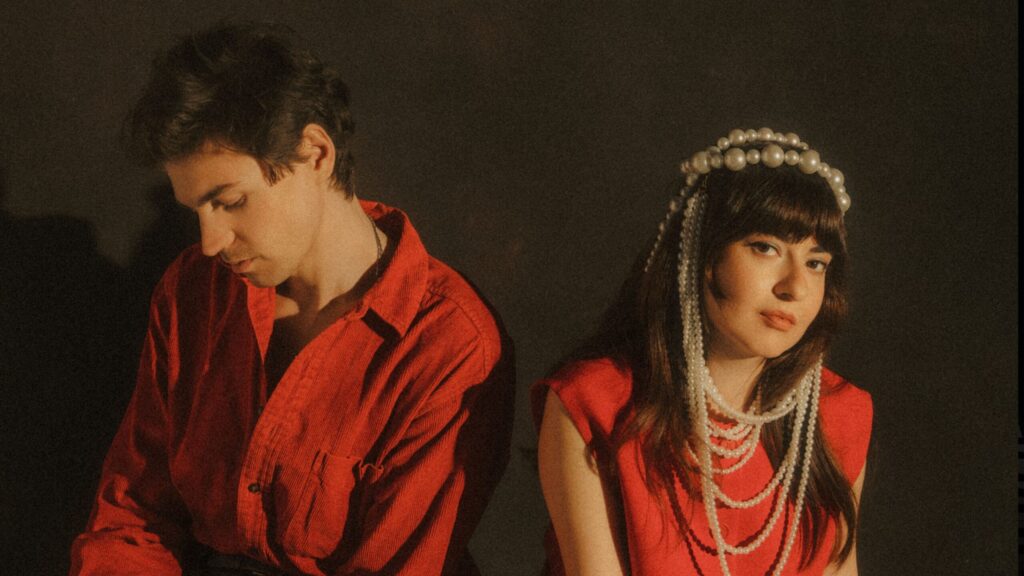Kit Sebastian — the London-based duo consisting of Merve Erdem and K Martin is known for their vintage sound. The duo has been captivating audiences around the world with their distinct mix of 60s psychedelia, Turkish folk, and nostalgic groove. We sat down with them for an intimate conversation about their identity, rich musical influences and their dream to tour with a full Arabic orchestra.
⸻
Introduction
Where does your artist name come from?
Choosing a name was difficult for us, because we are influenced by so many different styles. We wanted a name that didn’t box us into any genre or culture. A Turkish name, or something overtly psychedelic, would have immediately categorized us. “Kit Sebastian” is intentionally neutral. When you hear our name, you don’t immediately know what kind of music we make. That ambiguity is important to us.
How would you describe your music to someone who’s never heard it before?
It’s a blend of many genres, but all guided by a certain emotion. At our shows, people can dance, groove and have a good time, but there’s also space for reflection and melancholy. A lot of artists in our scene focus on fun and rhythm, we like to occupy a more introspective, emotional space.
What kind of stories do your songs tell?
We explore a wide range: from heartbreak and loneliness to migration and belonging. We never set out to write just love songs, or to stick to one kind of emotion. Our songs are not one-dimensional. Sometimes a song that sounds upbeat will have a darker undercurrent. Other times, a sad melody might carry a moment of humor or lightness. That contrast feels natural to us, it reflects how life is. No feeling ever exists in isolation. One day something feels tragic, the next time you will laugh about it. Songwriting takes time and gives us that distance and perspective. Contradiction feels natural, it reflects our personalities and how we see the world.
⸻
Roots
How does your heritage play into your music?
I (Merve) grew up in Turkey and naturally developed a strong bond with music. It’s everywhere, and it already reflects a mix of cultures. Turkish and Greek music, for example, share a long history, and you find similar overlaps with the Balkans, North Africa, and the Middle East. Everything is inspired by each other. I grew up with Turkish folk and classical music, which in structure and emotion often connects with Arabic traditions. You can hear some of that heritage in the way I sing or how we write songs. But we’re not obsessed with it. For us it’s more important to take those roots, play with it and do something new with them. Heritage is part of our music, but it’s not the focus.
What other influences can be heard in your music?
Our influences come from all over the world, from French chanson and Turkish folk to Brazilian psychedelia and Arabic orchestration. Honestly, we could probably name an influence from almost every country. But if we had to place it geographically, there’s a strong pull toward the Mediterranean and Aegean regions, places like France, Tunisia, and Turkey. There’s a deep musical richness in those cultures that resonates with us. And sonically, we’re especially drawn to the spirit of the 60s and 70s.
Having all those influences coming together, what does “fusion” mean to you?
Fusion, for us, isn’t about showcasing cultural exchange for its own sake. It’s about hearing musical ideas as sounds, not as things that belong to a particular tradition or nationality. When we write, we simply ask: what would serve this song best? That might mean combining instruments or textures that don’t traditionally go together and that’s exactly the point. Take the orchestra, for example. It was formed hundreds of years ago and has hardly changed since, even though new instruments have emerged and travelled across borders through migration. The same goes for many bands today: bass, guitar, drums, and that’s it. But there’s a wealth of instruments. We believe in opening up that palette and bringing in what’s been overlooked. Not out of novelty, but because it genuinely expands what music can express.
So which of those more traditional or exotic instruments do you use?
In the studio we want to use all of them – yeah. But live it’s a different story. It’s not just a matter of artistic choice, there are also practical limits: budget, logistics, and how many people you can realistically bring on stage. You can’t tour with a 15-piece band every night, even if you’d love to. If everything were possible though? We’d love to perform with a classic Arabic-style orchestra blending Western orchestral instruments with traditional ones like oud, ney, qanun, and layered percussion. Maybe even throw in a vintage organ.
⸻
Live
Is there a particular feeling you want to evoke on stage?
The way we are on stage is actually quite different from how we sound in the studio. Since we can’t bring all the instruments with us, we have to rearrange the songs to work within the setup of a five-piece band. But even with a smaller setup, we try to stay true to the essence of each track.
What we aim to bring to the stage is a wide range of emotions, from darkness to happiness, from joy to reflection. For us, it’s really about creating a shared energy with the audience. That sincere exchange where everyone in the room feels connected, even in different ways, is what matters most.
Is there a live performance you’ll never forget?
Our first concert in Turkey. It was my (K’s) first time visiting the country, and people were singing the lyrics of our songs. That singalong is not something you see much in Northern European cultures. It was satisfying, overwhelming and beautiful. And there’s this moment in our shows where we ask the crowd to dance together. I always get nervous whether they’ll do it. But when it works… it’s magical. Time stands still and we want that moment to stay forever.
⸻
Inspires
What’s next for Kit Sebastian?
We have a few projects we cannot talk about, but they are exciting! We just released a new single, and we’ll be sharing something extra before the end of the year. Next week we’ve three gigs in Turkey in cities we’ve never played before and we’re working on a special album with covers of songs from around the world, in our own style. We can’t wait to share it.

